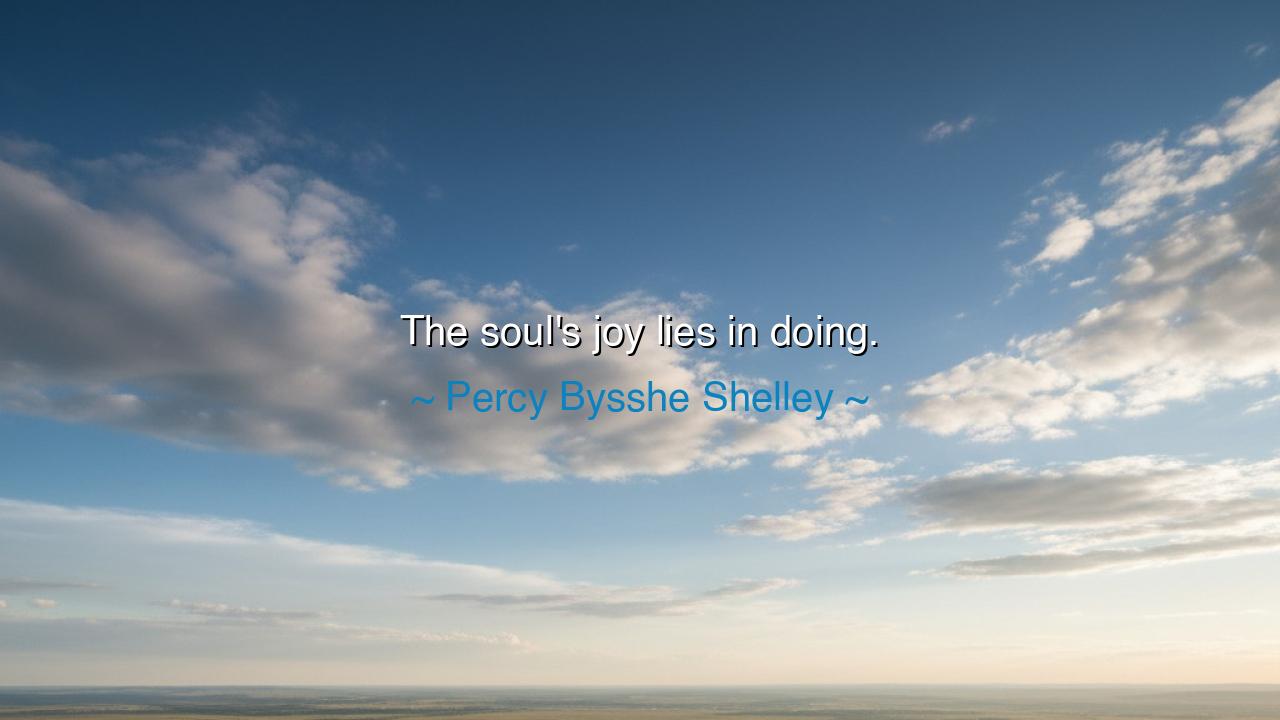
The soul's joy lies in doing.






"The soul’s joy lies in doing." Thus spoke Percy Bysshe Shelley, the poet who clothed fire in words and gave wings to thought. His saying is not mere ornament, but a torch of wisdom: that the spirit of man finds its true delight not in idleness, not in the hollow possession of things, but in the living act—in the doing, the striving, the creating. For the soul is no still pond; it is a river, and its happiness is found in flowing.
The ancients declared much the same. Aristotle taught that the highest good is found not in passive pleasure, but in energeia—activity in accordance with virtue. The Stoics too proclaimed that to live is to act, to fulfill one’s role in the great harmony of the cosmos. A life without doing is a life that withers, for the soul longs to unfold itself in deeds, as a seed longs to burst forth into bloom.
History shows this truth in Leonardo da Vinci. He was not content merely to dream or to observe, but to do—to sketch, to paint, to build, to experiment. His joy was not in wealth or idle comfort, but in the constant activity of creation. His soul danced in the act of discovery, proving Shelley’s words: happiness is not in the result alone, but in the sacred labor itself.
So too in the life of Florence Nightingale, who could have lived in ease but instead found her joy in doing—serving the sick, bringing order to chaos, and birthing modern nursing. Her soul was not nourished by comfort but by service. In the darkest of hospitals, amidst suffering and death, her spirit glowed because it was in motion, fulfilling its deepest calling.
Therefore, let this lesson endure: do not seek happiness in possessions or in idle dreams, but in the doing of your purpose. The soul’s joy is born in movement, in the shaping of the world through labor, love, and service. To act is to live fully; to stand still is to wither. Shelley’s words are a summons across the ages: rise, labor, create, serve—for in the act itself, the soul tastes its truest delight.






TATu Anh
I love the idea that the soul finds joy in action. It reminds me of the concept of flow, where you’re fully immersed in an activity and time seems to disappear. But does that mean that the soul only thrives when constantly engaged in something? What about those moments when we step back and simply enjoy life without doing anything? Is there value in stillness, or is it all about the act of doing to find happiness?
TNThao Nguyen
This quote really makes me think about how much joy we derive from productivity. I often feel a sense of satisfaction when I complete tasks or achieve goals, and it’s easy to equate that with happiness. But then again, there are times when the idea of doing things feels overwhelming, and the joy is harder to find. Can the joy of doing be linked to the right mindset or is it more about finding the right type of action?
Xxuananh
This quote resonates with me, especially when I think about how often I’ve felt fulfilled after completing a task or creating something. The act of doing seems to bring purpose. But I’m curious about whether there’s ever a point where doing becomes exhausting or counterproductive. When does the act of doing stop being joyful and start feeling like a chore? How can we ensure that our actions are fulfilling rather than draining?
TDTran Thi Diu
I totally get where Percy Bysshe Shelley is coming from. There’s something deeply satisfying about being productive and contributing to the world in a meaningful way. But I also feel that sometimes, we get too caught up in doing things just for the sake of doing. Is it possible to lose sight of true joy if we’re constantly trying to be busy? How do we make sure we’re doing things that actually bring us joy, not just fill up time?
THTrang Ho
I think there’s truth in this quote, especially when I consider how much more alive I feel when I’m actively engaged in something I care about. But at the same time, I wonder if this is true for everyone. For some people, the joy might come from simply being, not necessarily doing. Is it possible that the soul finds joy in both action and stillness, depending on the person or the situation?